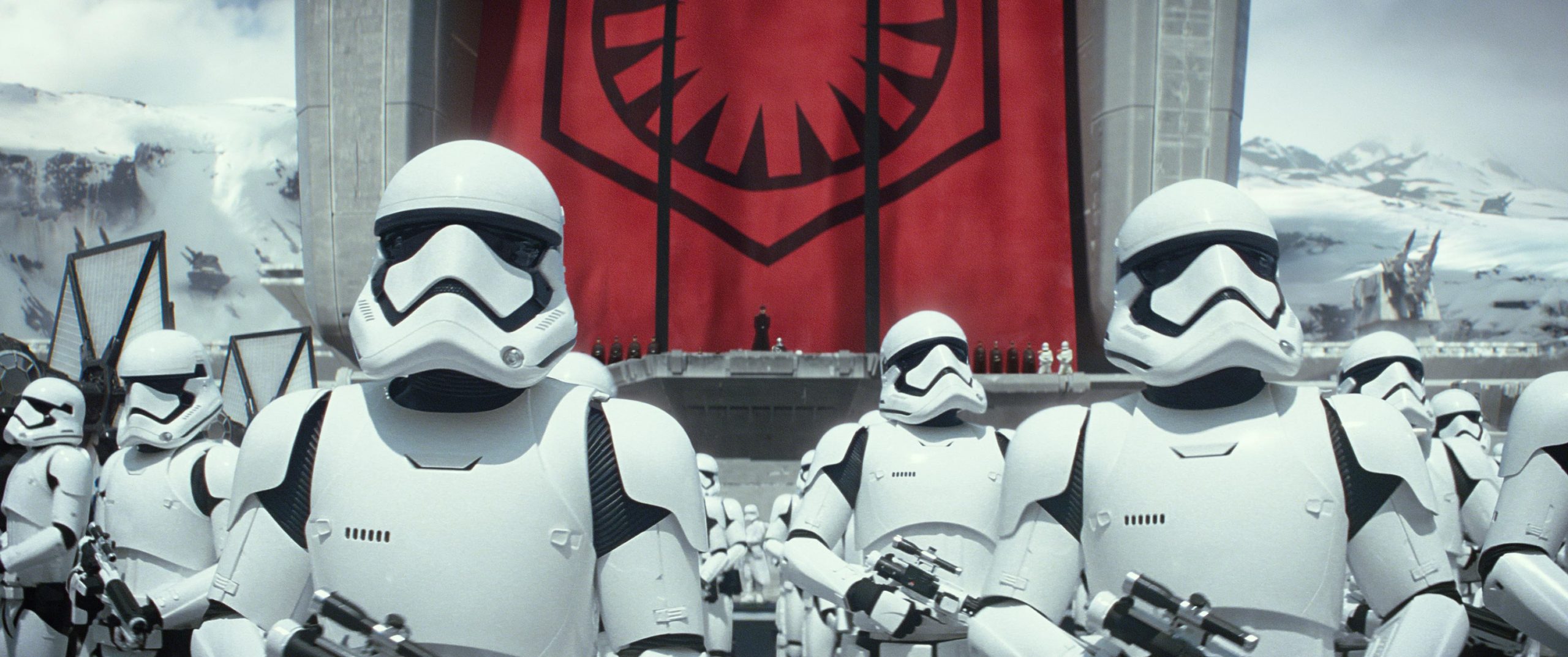One does not need to look very far for homages to history within George Lucas’s Star Wars franchise. A noble Republic transforms into a corrupt Empire in a reflection of ancient Rome, and, of course, that Empire employs stormtroopers and commits genocide in a dark mirror of Nazi Germany. This last comparison has been clear from the moment Star Wars premiered in 1977, and has served the franchise well in these intervening forty years. Indeed, when asked to tease the origins of the First Order, villains of the Disney sequel trilogy, Lucasfilm representatives likened them to Nazis who escaped to Argentina; this time, however, those escaped fascists regroup and strike back. It is precisely this appearance of the First Order, however, that has begun eroding Star Wars’ original fascist allegory for me, for as the First Order ascends in villainy, Star Wars seems intent on mitigating the evil of the original Empire.
It’s a conundrum as old as sequels; how do we make the new villain threatening enough to be taken seriously, while not invalidating the heroes’ previous victory? When Star Wars Episode VII: The Force Awakens premiered in 2016, it seemed that Star Wars’ current answer was “Just add more.” More villainy, more fascism, more genocide. Instead of alluding to Nazi rallies, troops all in rows, the First Order would recreate a Nazi rally, spit-flecked speach and all, and conclude it with the destruction of an entire solar system. In escaping the fall of the Empire, these new antagonists were the worst of the worst; distilled evil, purified of the dross of the old order. In fact, they were so evil, they were left intentionally near-comical in a rebuke of modern fascist movements at home in the United States and abroad. In recreating the Third Reich in space, however, a discerning historian might say that Star Wars has confused its empires.
If the Empire of the classic trilogy was simply an allusion to fascism, a potent mix of pure, Sith evil leading masses of old, loyal Republicans and traumatized war survivors caught up in the regime change and simply looking to preserve order, that Empire begins to look less like Hitler’s Third Reich and more like the Kaiser’s second. The Kaiserreich may not have been quite as totalitarian as its predecessor, but it remained a highly militaristic, authoritarian state that would commit a slew of atrocities across Africa and Europe in the forty-six years of its existence. Indeed, much of the fiction, spread across novels, comic books, and television, of the ‘New’ canon of Star Wars seems intent on rehabilitating that old Empire, including among its heroes’ ranks numerous former soldiers, pilots, and leaders of Palpatine’s Empire. This in and of itself is nothing new; for decades, it has been part and parcel of Star Wars lore that the Rebellion included many former Imperials in its ranks. The difference, however, is timing. Before, those defectors left before or as a result of the planetary genocide committed during the events of 1977’s Star Wars; now, characters are seen excusing, even defending, that genocide for years before switching sides. Such reconciliation smacks more of the aftermath of the First World War and the pervasive memory of it as a tragic, pointless conflict between equally-at-fault, equally-courageous combatants. Indeed, I would guess that many readers balked at my previous description of the Kaiserreich as the unmitigated ‘Bad Guys’ of the First World War and preceding decades.
This comparison, of course, ignores the fact that George Lucas’s original Empire is led by the embodiment of pure evil, and perhaps that is the point. As passing as this new resemblance may be to Germany of the 1910s, the Galactic Empire of Star Wars was intended as and should always be an analogue of Nazi Germany. For a new antagonist to be evil, its predecessor need not then be inherently less evil. That said, and at the risk of sounding too serious in such a nerdy post, I do think we all need to be concerned over the trend of excusing fascism in the twenty-first century. Some modern rhetoric and story-telling conventions to the contrary, the message of the Second World War remains that just following orders is not an excuse and “First they came for…,” not “Remember, there were a lot of normal people in Nazi Germany who weren’t bad!” As far as I’m concerned, the same should hold true in my beloved galaxy far, far, away.


One reply on “An Empire Revised: Star Wars, Fascism, & History”
How closely do you think the films–and the Empire–should be understood in the context of their times, rather than just historical imagery? I read once that the Vietnam Era played a major role in coloring the struggle between Empire and Rebellion.